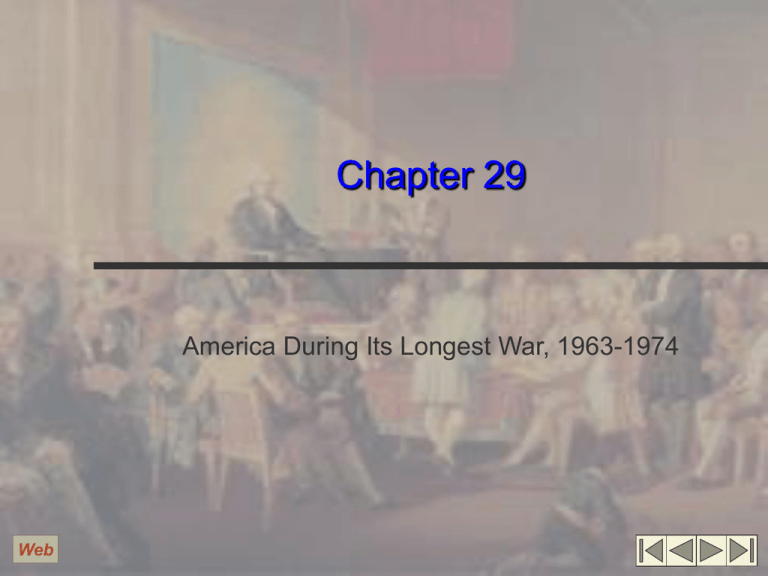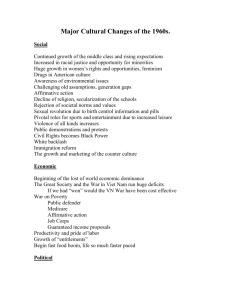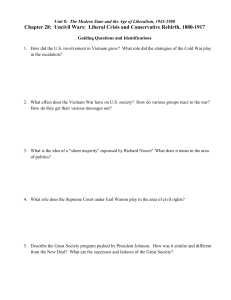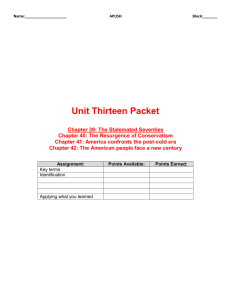Chapter 29
advertisement

Chapter 29 America During Its Longest War, 1963-1974 Web Lyndon B. Johnson in the White House Built on politics of consensus Determined to continue Kennedy’s initiatives Tax cut proposal War on Poverty Economic Opportunity Act – Office of Economic Opportunity – Job Corps – VISTA Civil Rights Civil Rights Act of 1964 – Equal Employment Opportunity Commission – Prohibited racial discrimination in public accommodations associated with interstate commerce Mississippi Freedom Summer Freedom Democratic Party Election of 1964 Republicans nominated Barry Goldwater Unabashedly conservative campaign Described as on the “radical right” Even many republicans considered him extreme Johnson reelected handily Trouble beneath the surface Appeal of segregationist George Wallace Reinvigorated conservatives Propelled new Republicans into prominence – Ronald Reagan – William Rehnquist Great Society Fulfillment of dreams of Johnson’s Democratic predecessors Medical care for the elderly and low-income citizens (Medicare and Medicaid) Created Department of Housing and Urban development Voting Rights Act of 1965 Heartened Johnson’s supporters and appalled his critics Goal was to help people fight their own way out of economic distress Evaluating the Great society Rekindled debates about proper role of national government Raised expectations that could not be met Conservatives have been unrelentingly critical Leftists lamented failure to challenge the prevailing distribution of political power and wealth in order to reduce poverty Agreement that Great Society left its mark First significant outlay of federal dollars for social programs since New Deal Significantly expanded reach of welfare state Escalation in Vietnam, 1964 Tonkin Gulf Resolution Stemmed from confusing events in August, 1964 Resolution in Congress Became justification for concerted U.S. involvement “All necessary measures to repel armed attack” Johnson used as tantamount to congressional declaration of war Debate over extent of American involvement within administration Escalation in Vietnam, 1964 (cont.) Some voices calling for stepped up U.S. presence Others warned than “Americanization” would bring only defeat Johnson feared political consequences of pulling out – Feared fallout on Great Society – Believed in domino effect Operation Rolling Thunder Deployment of U.S. ground forces Escalation in Vietnam 1965 Use of napalm to defoliate jungle cover Further ground troop deployment Each escalation seemed to make further escalation inevitable U.S. and North Vietnam became locked in game of escalation and counter-escalation Search and destroy missions Saturation bombing (Operation Ranch-hand) Johnson refused to be candid with public about extent of war escalation I.S. escalation generated help to North Vietnam from China and the Soviet Union South Vietnamese government in precarious state Countryside being devastated Flood of U.S. aid dollars destabilizing economy ©2004 Wadsworth, a division of Thomson Learning, Inc. Thomson Learning™ is a trademark used herein under license. Vietnam War The Media and the War Lack of actual Declaration of War prevented strict controls on reporting Television coverage made Vietnam a “living room war” Johnson fanatical about monitoring war coverage Antiwar activists criticized perceived prop-war media coverage Some reporters were overt in their criticism Public became polarized into “hawks” and “doves” The New Left Students for a democratic Society (SDS) Endorsed civil rights and the fight against racial discrimination Port Huron Statement – Called for participatory democracy that would be responsive to the wishes of local communities General opposition to the “establishment” Unrest on college and university campuses War came to dominate agenda of student protesters by 1966 Debate over student deferments Draft card burning Unstructured demonstrations came to dominate campus life ©2004 Wadsworth, a division of Thomson Learning, Inc. Thomson Learning ™ is a trademark used herein under license. American Attitudes toward Vietnam War The Counterculture Rejected traditional attitudes on clothing, hair styles, and sexuality Embraced an experimental approach to daily life and an environmental ethic Media highlighted association with drugs, communal living arrangements, and new forms of folk-rock music Participated in 1967 march on the Pentagon From Civil Rights to Black Power Watts riots, 1965 Malcolm X and Black Power Black Panthers Initially affiliated with Nation of Islam Integration was unworkable Self-defense “By any means necessary” Renewed pride in African-American heritage Vigorous efforts at community reconstruction Organized Organization of Afro-American Unity after breaking with Nation of Islam Murdered in 1965 by enemies of Nation of Islam Criticized slow pace of civil rights litigation Preached confrontation and self-defense Civil Rights Act of 1968 Fair housing provision watered down to protect landlords and real estate agents Federal offense to cross state lines in order to incite a “riot” – Directly aimed at Black Panthers 1968:Violence Overseas Tet Offensive, January Serious psychological defeat for United States Called into question claims of imminent victory Contributed to policy that would later be called “Vietnamization” Johnson announced he would not run for reelection, March – Halted bombing of North – Initiated peace talks 1968: Violence at Home Assassination of Martin Luther King, Jr. in April Spurred violence and riots across the country Assassination of Robert F. Kennedy in June Violence at political conventions Republicans plagued by racial violence in Miami Democrats hurt by brutal suppression of anti-protesters in Chicago Election of 1968 Vice-President Hubert Humphrey was Democratic nominee Republicans ran Richard Nixon George Wallace ran on American Independent Party Spoke of using nuclear weapons to end war in Vietnam Nixon won narrow victory Nixon’s Economic Program Two decades of economic growth came to an end during Nixon presidency Inherited high levels of domestic spending, and expensive war in Vietnam, and the deteriorating, but still favorable balance of trade Soaring unemployment and price inflation What economists came to call “stagflation” Nation ran its first trade deficit of the twentieth century in 1971 New Economy policy 90 day freeze on wages and prices Subsequent government monitoring to detect excessive increases in either Nixon’s Economic Program (cont.) Abandoned gold-to-dollar ratio in 1971 Dollar would thereafter “float” against both Gold and all other currencies Devalued dollar in 1973 Cheapened price of American goods in foreign markets Little improvement of U.S. trade balance resulted Nixon’s Social Policy Family Assistance Plan Abolish other welfare programs, including AFDC Institute a guaranteed annual income for all families End Post-New Deal system of aid to those in particular circumstances Provide aid to everyone Not implemented New federalism plan to return federal tax money to the states in the form of black grants with virtually no restrictions Supplementary Social Security Insurance for the elderly, blind, and disabled Gradual expansion of Medicare and Medicaid Social Security payments indexed to inflation in 1972 The Supreme Court during the Nixon Administration Dominated by activist majority devoted to recognizing a broad range of constitutionally protected rights Miranda v. Arizona guaranteed rights to persons accused of violent crime – Conservatives saw as coddling of criminals Three conservative justices appointed by Nixon Harry Blackmun, William Rehnquist, and Lewis Powell Dandridge v. Williams declared that welfare was not a national right Roe v. Wade ruled that a state law making abortion a crime violated a woman’s right of privacy Foreign Policy Under Nixon Key Advisor was Henry Kissinger, national security advisor Détente as major foreign policy goal Strategic Arms Limitation Talks with Soviet Union Opening toward China Vietamization Withdrawal of U.S. troops Stepping up of air war and intensifying diplomatic efforts to reach settlement Nixon Doctrine – U.s. Military assistance to anticommunist government in Asia – Nations left to provide their own military forces Foreign Policy Under Nixon (cont.) Withdraw U.S. troops but not accept compromise or defeat Adhered to bombing halt over North New operations in South Incursion into neutral Cambodia – Spurred opposition at home • Kent State and Jackson State – Contributed top rise of Khmer Rouge End of U.S. involvement in Vietnam Secret war protected in Laos and Cambodia after 1970 Peace talks in Paris proceeded as war was actually expanding Communists within 30 miles of Saigon in the Spring of 1972 Cease-fire announced weeks before 1972 election After election, U.S. firepower increased dramatically Christmas bombing Paris Peace Accords, 1973 Nixon responded with resumption of bombing and mining of harbors in North Withdrawal of U.S. troops South Vietnamese discontinued to fight Collapsed in April 1973 Aftermath of the Vietnam War 3.5 million Americans served, 58,000 died, 150,000 wounded, 2,000 remain missing Blame game played by all sides after the war was after All Americans could be “no more Vietnams” Watergate Caused collapse of Nixon’s presidency stemmed from Nixon’s deep mistrust for nearly everyone in Washington Established “plumbers” unit to protect administration from “enemies” Funded by illegal campaign contributions Broke into Democratic Party’s headquarters during 1972 re-election campaign – Irony is that Nixon won election handily and didn’t need to resort to “dirty tricks” to win Administration was involved but denied it and instituted cover up instead The press, Congress, and the federal judiciary, all began searching for the truth Eventually bits of the truth began trickling out, and Nixon was implicated in both the original break in and in the cover up Watergate (cont.) Nixon continued to deny involvement, even after discovery of a secret White House taping system that could implicate him if the tapes were surrendered to the courts House Judiciary Committee voted three articles of impeachment Web Obstruction of Justice, violation of constitutional liberties, refusal to produce evidenced requested during the impeachment process In the end, Nixon chose to resign rather than face trial by the senate Supreme Court ruled unanimously in U.S.v. Nixon that he had to give them up Left office in disgrace on August 9, 1974, succeeded by Gerald Ford Received an unconditional pardon by Ford Public knowledge and understanding of Watergate not high today






